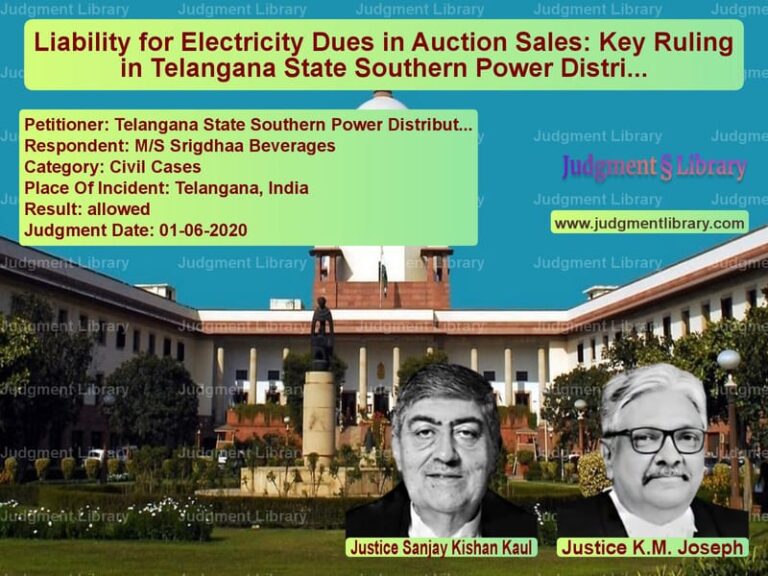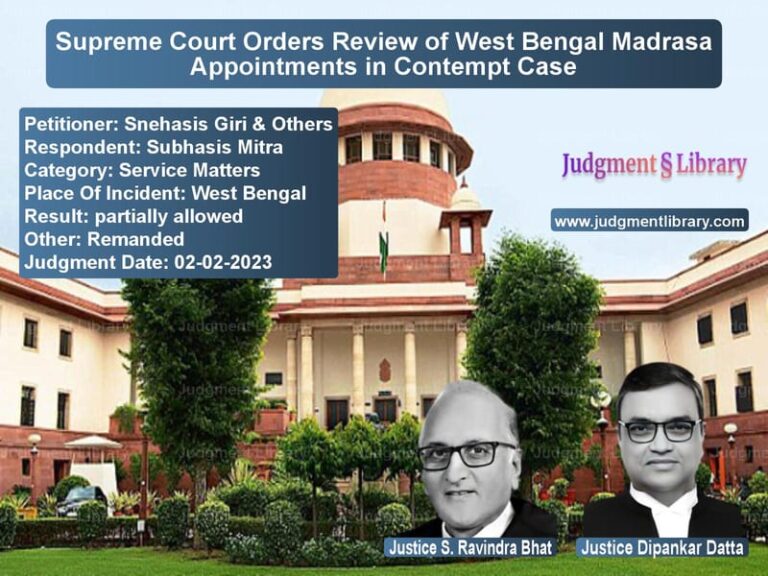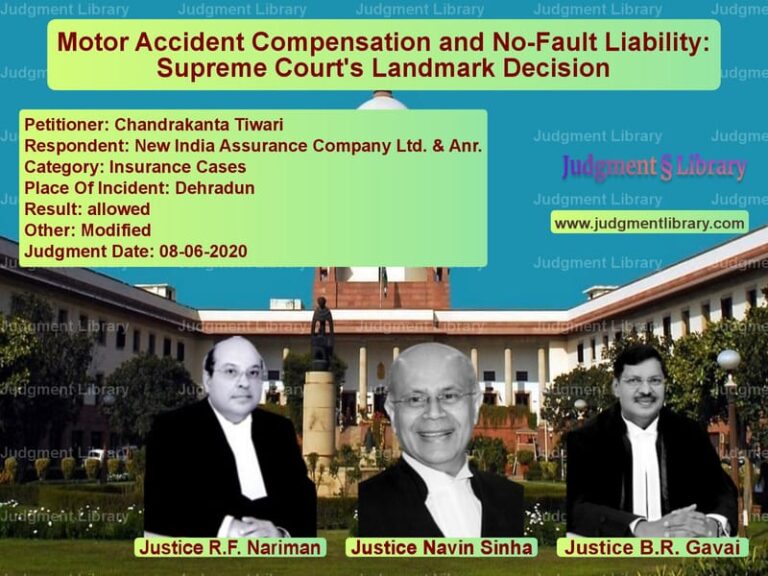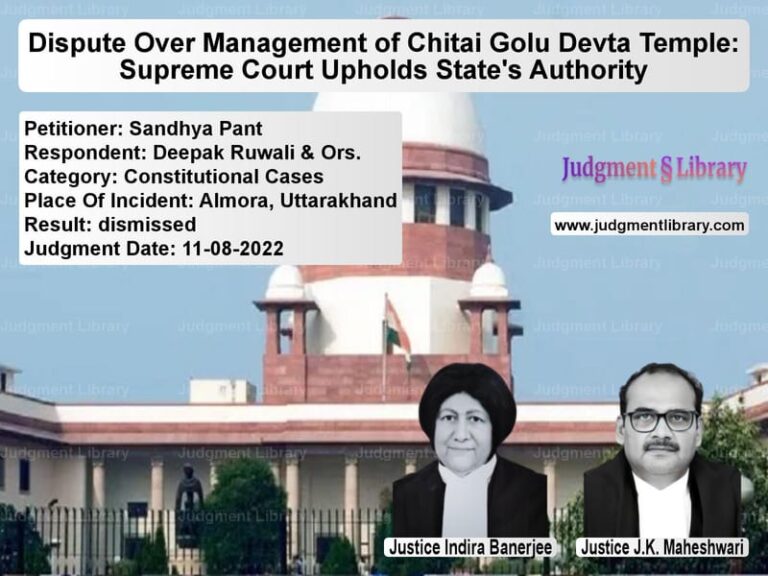India-Bhutan Arbitration Dispute: Supreme Court Modifies Delhi High Court Ruling
The Supreme Court of India recently delivered a significant ruling in the case of Punatsangchhu-I Hydroelectric Project Authority vs. Larsen & Toubro Ltd., addressing a complex arbitration dispute involving an international infrastructure contract between India and Bhutan. The case revolved around the interpretation of arbitration clauses, the governing law, and the designated seat of arbitration. This ruling provides crucial guidance on arbitration agreements in cross-border projects and reinforces the principle of party autonomy.
Background of the Case
On 14th April 2009, a contract agreement was signed between Punatsangchhu-I Hydroelectric Project Authority (PHPA), Bhutan and Larsen & Toubro Ltd. for the construction of a hydroelectric project in Wangdue Phodrang District, Bhutan. The contract contained detailed arbitration provisions, including the applicable law and the procedure for appointing arbitrators.
The key clauses relevant to the dispute were:
- Clause 5(i)(b): The contract would be governed by the laws of Bhutan and fall under the jurisdiction of Thimphu courts.
- Clause 67(ii): In the absence of an arbitration law in Bhutan at the time of signing, arbitration proceedings would be guided by India’s Arbitration and Conciliation Act, 1996.
- Clause 67(iv): If the parties failed to appoint arbitrators within 30 days, the Chief Justice of the Delhi High Court or Thimphu High Court would have the authority to appoint arbitrators.
- Clause 67(vii)(a): Arbitration would take place either in New Delhi, India, or Thimphu, Bhutan.
However, in 2013, Bhutan enacted its own arbitration law, the Alternative Dispute Resolution Act of Bhutan, 2013, which introduced a new legal framework for arbitration in the country. This led to differing interpretations of the contract’s arbitration clauses.
Initiation of Arbitration Proceedings
On 28th July 2020, Larsen & Toubro Ltd. issued a notice of arbitration, invoking Clause 67(ii) of the contract and appointing a retired judge of the Supreme Court of India as its nominee arbitrator. However, PHPA responded on 4th August 2020, stating that the arbitration should be governed by the Bhutanese law, as per Clause 5(i)(b), and that the seat of arbitration should be in Thimphu.
In October 2020, Larsen & Toubro Ltd. filed an application under Section 11(6) of the Indian Arbitration and Conciliation Act, 1996, before the Delhi High Court, seeking the appointment of an arbitrator on behalf of PHPA.
Delhi High Court’s Ruling
On 11th December 2020, the Delhi High Court ruled in favor of Larsen & Toubro Ltd., stating that:
- The reference to the Indian Arbitration and Conciliation Act, 1996, in Clause 67(ii) was valid and did not cease to apply upon the enactment of the Bhutanese arbitration law.
- Since PHPA had failed to appoint its arbitrator within the stipulated time, the court had jurisdiction to appoint one.
- The arbitration proceedings would be governed by the Indian Arbitration Act, with New Delhi as the seat of arbitration.
This decision was challenged by PHPA before the Supreme Court of India.
Petitioner’s (PHPA’s) Arguments
PHPA, represented by the Solicitor General of India, made the following arguments:
- The contract explicitly stated that Bhutanese law would apply, and with the enactment of the Bhutanese Alternative Dispute Resolution Act in 2013, Indian arbitration law was no longer applicable.
- The contract provided for arbitration in both New Delhi and Thimphu, giving the parties the right to select Thimphu as the seat of arbitration.
- The Delhi High Court incorrectly assumed jurisdiction and wrongly appointed an arbitrator.
Respondent’s (Larsen & Toubro Ltd.) Arguments
The respondent, represented by senior counsel, countered these claims with the following arguments:
- The contract did not specify that Indian arbitration law would cease to apply upon the enactment of Bhutanese law.
- New Delhi was a valid seat of arbitration as per Clause 67(vii)(a), and the appointment of arbitrators could be made by Indian courts.
- However, in the interest of expeditious resolution, Larsen & Toubro Ltd. was willing to accept Bhutanese arbitration law, provided that the arbitration process was conducted fairly.
Supreme Court’s Decision
The Supreme Court, comprising Justices Indu Malhotra and Ajay Rastogi, reviewed the contractual provisions and the arguments from both sides. The court observed:
- The contract was signed in 2009 when Bhutan did not have an arbitration law, so the parties agreed to apply the Indian Arbitration and Conciliation Act, 1996.
- The enactment of the Bhutanese Alternative Dispute Resolution Act in 2013 provided a valid framework for arbitration within Bhutan.
- Given that the contractor (Larsen & Toubro Ltd.) was agreeable to arbitration under Bhutanese law, there was no need to insist on Indian arbitration law.
- Since both parties agreed on the seat of arbitration being Thimphu, Bhutan, the court modified the Delhi High Court’s ruling accordingly.
The Supreme Court ruled:
“In view of the consensus arrived between the parties, the order of the High Court stands modified to the extent that all disputes arising out of the Agreement dated 14.04.2009 shall be conducted in accordance with the Alternative Dispute Resolution Act of Bhutan, 2013 with the seat of arbitration at Thimphu.”
However, the tribunal was given the flexibility to conduct some hearings at other locations, in consultation with the parties.
Key Takeaways from the Judgment
- This case highlights the evolving nature of arbitration agreements and how they must adapt to changing legal landscapes.
- The ruling emphasizes that party autonomy is paramount in arbitration proceedings.
- It sets a precedent for cross-border contracts, clarifying how courts should interpret arbitration clauses when the governing law of a contract changes.
- The judgment ensures that arbitration proceedings remain fair and efficient while respecting the sovereignty of national laws.
Conclusion
The Supreme Court’s ruling in the Punatsangchhu-I Hydroelectric Project Authority vs. Larsen & Toubro Ltd. case is a landmark decision in international arbitration. By upholding the applicability of Bhutanese arbitration law while maintaining fairness in the arbitration process, the judgment strikes a balance between legal certainty and practical resolution of disputes.
For companies engaged in cross-border infrastructure projects, this ruling serves as a critical reminder to carefully draft arbitration clauses, keeping in mind potential changes in legal frameworks. It reinforces the importance of flexibility and mutual agreement in resolving contractual disputes through arbitration.
Petitioner Name: Punatsangchhu – 1 Hydroelectric Project Authority, Bhutan.Respondent Name: Larsen & Toubro Ltd..Judgment By: Justice Indu Malhotra, Justice Ajay Rastogi.Place Of Incident: Bhutan.Judgment Date: 22-02-2021.
Don’t miss out on the full details! Download the complete judgment in PDF format below and gain valuable insights instantly!
Download Judgment: punatsangchhu-–-1-hy-vs-larsen-&-toubro-ltd.-supreme-court-of-india-judgment-dated-22-02-2021.pdf
Directly Download Judgment: Directly download this Judgment
See all petitions in International Arbitration
See all petitions in Arbitration Act
See all petitions in Dispute Resolution Mechanisms
See all petitions in Contract Disputes
See all petitions in Enforcement of Awards
See all petitions in Judgment by Indu Malhotra
See all petitions in Judgment by Ajay Rastogi
See all petitions in Modified
See all petitions in Modified
See all petitions in supreme court of India judgments February 2021
See all petitions in 2021 judgments
See all posts in Arbitration and Alternate Dispute Resolution Category
See all allowed petitions in Arbitration and Alternate Dispute Resolution Category
See all Dismissed petitions in Arbitration and Alternate Dispute Resolution Category
See all partially allowed petitions in Arbitration and Alternate Dispute Resolution Category







